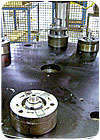
BorgWarner-Diversified Transmission Products Inc. (Muncie, IN) manufactures four-wheel-drive and traction control systems for the automotive industry. Its primary products are four-wheel-drive transfer case assemblies used by Ford Motor Co. and General Motors in sport utility vehicles and pickup trucks.
In 2001, shortly after introducing a new transfer case model, BorgWarner found it had a problem. The punches used to deform the ends of shafts, or axles, in the cases’ reduction carriers and differential carriers were wearing out almost as fast as the company could manufacture them. The cost in toolmaker time, maintenance and press downtime was becoming prohibitively expensive.
To solve the problems, BorgWarner began having the punches coated using a proprietary thermal diffusion process from the TD Center (Columbus, IN). The punches were coated and heat-treated to harden their steel surfaces, helping to extend the life of the punches with less maintenance and less downtime.
“The carrier consists of axles fixed between two carrier plates,” says BorgWarner senior manufacturing engineer Brian Bunner. “Each axle is the rotational point for a pinion gear of a planetary gear set. We hit the axle on the ends to deform it, so it can’t come back out of the carrier housing. The problem we had was the punches were wearing away at the contact points. They were eroding. When this happened, the carrier began sticking to the punches in the upper tooling.”
“There’s a stripper plate involved in that operation,” adds plant senior mechanical maintenance engineer, Malcolm Lyon. “If that doesn’t work right, the part hangs onto the punches. When this happens, the dial table indexes with the part still on the upper portion of that tooling. Now the parts are stacked two high, and when the press comes down during the next cycle, we have a machine wreck.”
In all, there are five different staking operations where BorgWarner uses the punch configuration, with approximately 130 of the punches in use every day on various multifixture dial index machines. Each machine consumes 20 to 50 punches during a tool change.
According to Lyon, “We get a summary report regularly. It indicates the top five problem areas within a particular operation.... The staking press always made the list.”
To accommodate the new TD vanadium carbide coating, which measures from 0.0001 to 0.0003 inch thick, BorgWarner engineers redesigned the punches so they would fit with this extra material layer. After they were installed in the staking press, the performance improvement was both dramatic and immediate. Instead of lasting 2 or 3 weeks, as had been the case with the original equipment, the new punches lasted for 6 months or longer.
“Right now, we’re grinding the punches to the right diameter, so they’ll fit just right after coating,” Bunner says. “Then we send them to the TD Center for coating and heat treating. When they come back, they’re ready to install into the tooling on the press. We usually process 100 punches at a time. All together, we have about 130 punches cycling in production at one time.”
“Now, with coated punches, we can actually schedule planned maintenance for the punch changes," Lyon says. “We also have the ability to stagger the punch changes on different machines. This has greatly helped in reducing the number of punches carried in the tool crib and the number in the process of being manufactured.”
Not surprisingly, the fact that BorgWarner is going through far fewer punches has had a major impact on the bottom line. Since the changeover, the company has reduced the annual cost of maintaining its punch supply from $77,000 to $7,000.
The coated punches are also improving product quality. “Prior to coating...we went by press out, staked part appearance and whether the staked parts stuck on the tooling,” Lyon says. “When the punches would wear and erode, they left a rough material surface on the staked axle. It just didn’t look good. Now we get much better looking stakes over a much longer period of time. I think this adds to the quality of our product-at least from an aesthetic standpoint.”
For more on coating and hardening, visit www.tdcoating.com or call 877-832-3687.